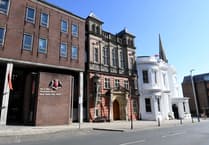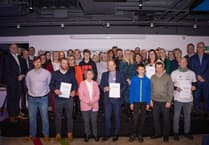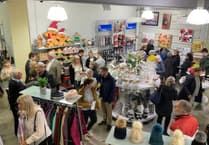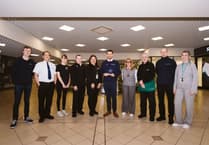An old friend of John Lennon speaks to reporter Paul Hardman about the background to the historic photographs he took of the Beatle’s first ever live performance, which will be at his Tynwald Day stall.
Charles Roberts who recently moved to Kirk Michael, knew John in his early years, along with the other members of his first skiffle band, the Quarrymen.
He used a borrowed Kodak Brownie box camera to take the shots of Lennon and the Quarrymen playing on the back of a coal lorry at the Rosebery Street party on June 22, 1957 in Toxteth, Liverpool.
The gig was cut short after a threatening atmosphere developed when a local gang thought Lennon was flirting with their girlfriends, with the group then escaping into Charlie’s mum’s house.
Going on to teach printing for 26 years at the senior art college which John also attended, it was Charles who also designed the promotional poster for the party.
It was here where he also reunited with Paul McCartney, who stopped by the college for a visit with then-wife Linda McCartney in the 90s.
After Charles, now aged 83, introduced himself, he said Paul stood there and said ‘you know what it’s nearly 40 years since I last saw you’ having not recognised him immediately.
Some of the pictures being sold on Tynwald Day are signed by three of the living Quarrymen: Colin Hanton, Rod Davis and Len Garry.
These members still play gigs, and Charles said he would like to organise it for them to come over to the island and play at the Peel Centenary Centre.
However, he pointed out that they are all in their early 80s and are not so eager to travel outside the Liverpool area.
Charles says that at his stall he will be happy to try to answer any questions Beatles fans may have about John and the early days, as well as sign copies of his book ‘Just Like Starting Over’ in which he documents his experiences at the time.
Another memory he has which typifies the feeling of the era was of Paul and John being driven around in the back of a 1957 Vauxhall Cresta with ‘American-style wings’.
In the car Paul was practising songs like ‘Raunchy’ by American artist Bill Jurtis, as they cruised from Menlove Avenue into Woolton Village.
The first time he met John was at a Quarryman practice session which he was brought to by his friend Colin, the drummer.
‘When John came in Colin introduced us, he said to me “Alright Charlie, what do you play”, I said “I don’t play anything” and he answered “Well you’re in good company with this lot”.
‘Because they were all amateurs, it was only because of the boom in skiffle music that people started buying guitars and learning to play,’ Charles added.
Asked about the last time he saw John, Charles said: ‘I was getting the bus back to work at my job in the printing department of the TJ Hughes store.
‘I was in the front seat and when I got up for my stop, I noticed there was only one other person, on the backseat of the bus, and it was John.
‘We didn’t have time to have a conversation, he just said ‘Oh hi Charlie’, I asked how he was doing and I’ll never forget he said: “I’m knackered, I’ve just come back from Hamburg”.
Talking about how the city had changed since the ‘Merseybeat’ days of the late 50s and 60s, Charles told us:
‘In my time in my teens, Liverpool was really run down after the war, it took a lot of time to rebuild it from the bombing.
‘Then all of a sudden, everything started being revitalised, and now it’s a great place for tourists.
‘And it’s still a friendly place, but you’ve got these [dangerous] elements – I was just reading in the Liverpool Echo about an alleged stabbing on Mathew Street.
‘You never heard about anything like that when we were in our teens.’
He continued: ‘I met my wife in The Cavern in 1958, and we used to go there every weekend. We never saw a fight or anything.
‘There was no alcohol in there, but you didn’t seem to get the idiots around that you get nowadays’.
Charles used to go to gigs with the Quarrymen for around three to four years, and would ‘knock around’ their houses a couple of times a week.
‘People used to say to me why didn’t you stay in touch with John, but I didn’t want to because I always thought if I wrote to him people might think I’m trying to cash in on his fame or his money, he said.
‘And I regret that now, because after he died I was told that he longed to be in touch with his old mates from Liverpool.’
Asked about what John was like, he said: ‘He was very witty, and could be quite sarcastic at times.
‘But I always liked his humour, he was a big fan of The Goon Show on the radio.
‘And he was always coming out with squeaky voices like they used to make on there.’
Charles continued: ‘He wasn’t the hard man people used to think he was, he used to pretend to be a teddy boy (gang member).
‘He was never involved in any aggro or scraps with anyone in those days.
‘In a lot of the films they’ve made depicting the Quarrymen and Beatles, all the lads swear in it, but people didn’t at the time.’
Asked if it seemed like there was anything special about John at the time, Charles said: I think we all thought that there was something there.
‘And obviously they [The Beatles] were developing in Liverpool, and very popular in the city – but we never expected them to reach the heights they did, I mean nobody could foresee that’.




